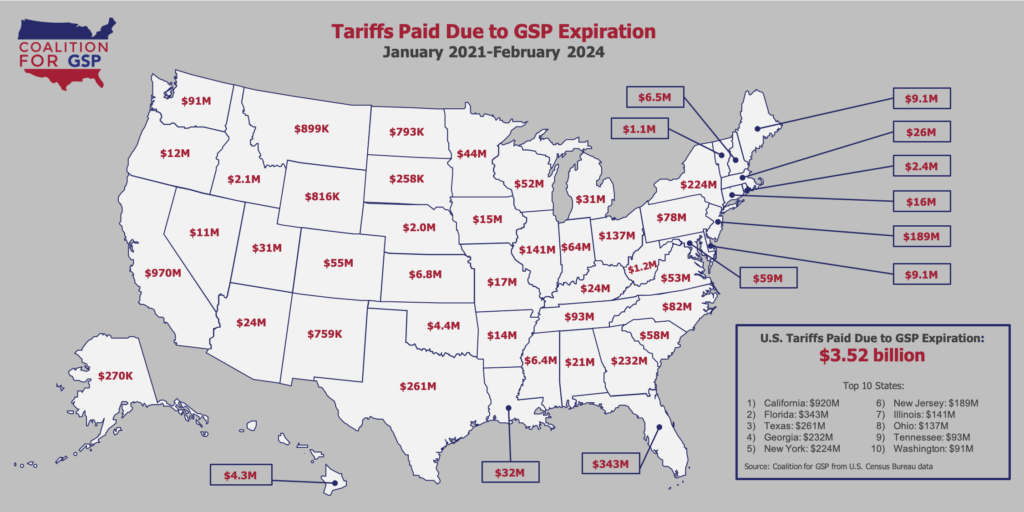The Coalition for GSP strongly supports approval of the amended GSP Reform Act (HR 7986) at the House Ways and Means markup later today. This is not the final step, but an important one to advance negotiations toward a long overdue GSP renewal package. The current lapse is nearly twice as long as any other in GSP’s nearly 50-year history and has cost American companies over $3.5 billion in extra taxes. The map below shows estimated minimum GSP tariffs paid by state due to GSP expiration.
GSP has always maintained strong, bipartisan support. The letter from 66 House Members, led by Reps. Neal Dunn (R-FL) and Jake Auchincloss (D-MA), is just one recent demonstration of support across the political spectrum. Many Ways and Means Members – Republicans and Democrats alike – have expressed frustration with the continued lapse and told GSP users they want to see it renewed as quickly as possible. This is their chance to prove it.
This commonsense reauthorization supports American companies, promotes U.S. national interests, and includes labor and environmental provisions, so no one can claim this is a partisan bill. Just yesterday, Ambassador Tai cited five eligibility criteria updates “to reflect GSP’s purpose” the Biden Administration needs in order to support GSP renewal: human rights, anti-corruption, rule of law, labor standards, environmental standards. This bill addresses each of those issues.
While much of the focus is on criteria, Ways and Means Members cannot ignore the tangible impacts of GSP expiration. For small businesses that depend on the program, GSP renewal has nothing to do with partisan victories:
- For Novita in Southern California, whose owners have accumulated over $3 million in debt to pay off $4.5 million in extra tariffs, it’s about avoiding bankruptcy and keeping their home.
- For dZi Handmade in Ranking Member Richard Neal’s western Massachusetts district, it’s about lowering costs on their fair trade imports from artisans of Tibetan diaspora.
- For Fast-Pak Trading in Secaucus, New Jersey, it’s about regaining large accounts it lost when it raised prices to cover GSP expiration costs.
- For Triad Magnetics in California and Hiblow USA in Michigan, it’s about moving ahead with planned expansions that will add new US manufacturing capabilities.
- For Rig’Em Right Outdoors in North Carolina, it’s about restarting the supply chain migration out of China that came to a halt after GSP expired in 2020.
No bill is perfect, including this one. But on the merits, it deserves bipartisan support to advance negotiations on a critical issue.

